The Time Machine (2002) - Movie Review
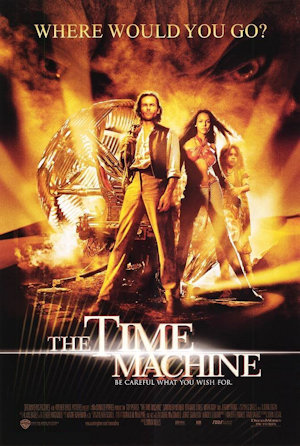 | | They seriously passed up the chance to use "When would you go?" |
The 2002 version of The Time Machine is not an adaptation of H.G. Wells' original novel; it is, in actuality, a remake of the 1960 film by George Pal. Despite a multitude of changes, it still claims to be based on David Duncan's decades-old screenplay, which itself deviates pretty heavily from the famous Wells story. Over a decade and a half after its theatrical run, this remake hasn't earned the "classic" label of its predecessor or the cultural staying power of the book. Instead, it is a largely forgotten and oft maligned big budget spectacle overloaded with CG and bogged down by preposterous action sequences in its final act. I am not here to argue that it deserves anything less--for it is certainly a flawed movie that is nowhere near as good as its source materials--but maybe it's not a total loss.
No doubt the biggest complaint leveled against the movie (starting before it was even released) is the decision to give the Time Traveler, this time named Alexander Hartdegen, a backstory involving a lost love. While it is handled poorly in the script and is something of a Hollywood cliché, it does give the protagonist far more depth than any of his previous incarnations. Alexander is more realized as a human character, more dynamic, and more interesting. This makes his transition to a man of action who fights against the Morlocks more thematically consistent than the same turn George makes in the 1960 original, because Alexander sees the failure of his own passivity quite dramatically in the first act and figures out the need to take action to prevent future failures by the third.
On the other hand, that's probably the least interesting theme the story has yet seen. Gone are Wells' commentaries on inequality and utopia, and even the anti-war themes of the 1960 film are forgotten. Instead, there's a loose suggestion that technology might be dangerous (Philby wonders if "we'll ever go too far," and the apocalyptic event that leads to the dystopia this time involves unsafe demolitions on the moon), but it takes a backseat to the more personal story of self-discovery that Alexander goes through in learning how to be an action hero. There's nothing inherently wrong with focusing more on the personal than the philosophical, but for a science-fiction fantasy like The Time Machine, renowned for its allegorical possibilities, that's a creative decision that sets the story at a distinct disadvantage before it's even gotten started.
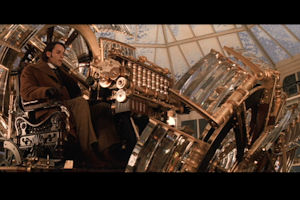 | | It's not as iconic as the original, but I do like the design of the new machine |
Therefore, if there is one fatal flaw about this movie that has lead to its descent into relative obscurity, it is the fact that it's based on The Time Machine. If it were an original story of its own, it might have been a bit more successful, at least as the sort of popcorn entertainment it aspires to be. Even then, I doubt many people would be talking about it sixteen years later.
It also makes a lot of seemingly arbitrary changes with no rhyme or reason. The setting is moved to New York, but that does nothing for the story. Filby, from the original film, is now spelled "Philby." Why? Just because. In this movie's universe, not only does the original H.G. Wells novel exist, but so does the 1960 film, which raises all kinds of dumb questions. The Eloi are now hardy, multilingual, self-sufficient cliff dwellers with a culture all their own, and though I can kind of see why (it gives Alexander something worth fighting for), it changes too much of the story's dynamic and utterly upends the symbiotic relationship the Morlock and Eloi are supposed to have. Similarly, the Morlocks no longer have an aversion to light, and that makes the whole day/night dynamic--which still exists for some reason--totally irrelevant. The museum now has a holographic exposition machine of its own, though I can forgive that because Orlando Jones is awesome.
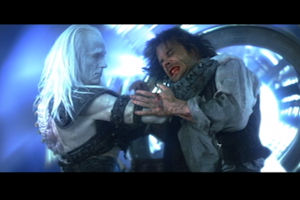 | | This is stupid |
Hands-down the worst addition, though, has got to be the Über-Morlock, a loosely-defined Morlock figurehead who stands opposed to the protagonist for, um, reasons. As much as I love Jeremy Irons (and his delivery of the line "Who are you to argue with eight-hundred-thousand years of evolution?" is pretty great), this is such a lazy, formulaic, insulting trope that I lose interest well before he and Alexander settle their philosophical disagreements in a ridiculous close-quarters fist fight while literally surrounded by CGI.
That said, this is still an earnest film with a lot to appreciate. As mentioned earlier, fleshing out the Time Traveler is a good idea, and even though he's a standard Hollywood template, Alexander is a more memorable character than his predecessors. (Granted, mileage may vary on your opinion of Guy Pearce as an actor; I happen to like him, but I understand if you don't.) The plot also succeeds in having more emotional punch, and there are a few glimmers of brilliance beneath the surface.
But the film's best strengths are most apparent when you look beyond the story. It's a well-made movie, and the hard work of those behind the scenes really shows. Granted, Simon Wells, a director whose previous work was almost exclusively on animated films, may not have been the wisest choice to direct such a high profile, big budget live-action film. Of course, the fact that Simon is H.G.'s great grandson is a hard-to-resist bit of free publicity that lends the movie more authenticity than it might deserve. As a matter of fact, there was a period of several days where Wells had to take an extended break for exhaustion, and Gore Verbinski took over. With the benefit of hindsight and considering the kind of filmmaker Verbinski would eventually become--the kind who can make pure, big budget Hollywood schlock and make it more entertaining than it should be--he might have been a better choice.
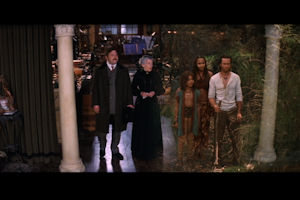 | | I wish the whole movie had toyed with the medium like this |
Probably the most inspired filmmaking is reserved for the final shot, an extended sequence in which we see the same physical location in two different time periods with various characters interacting with the environment. This demonstrates a more formalist approach that might have made the entire film more remarkable and interesting, but alas, the realist impulse permeates the entire rest of the film. Still, Simon Wells did his best, and his love for what he was trying to achieve is evident. There is some excellent filmmaking going on, highlighted by a ton of amazing effects, great production design, brilliant sets, ingenious lighting (I know that sounds weird, but really, this is one of the best-lit films of the naughties) and performances by well-cast actors. Yes, some of the CGI is wonky, and yes, the Morlock heads are too animatronic to properly suspend disbelief. Other than that, though, it's a beautiful spectacle.
It's just a shame all that hard work is let down by such a poorly conceived story. As an adaptation of H.G. Wells' novel, it's a barely recognizable bit of misguided fan fiction, but as a remake of the 1960 film of the same name, it's a downright failure. A remake needs to be almost as good as the original, at the very least, in order to succeed, and this film doesn't even come close. It's enjoyable if you turn off your brain--and it's probably even better if you have no familiarity with the source materials--but if you're looking for intelligent science-fiction that honors H.G. Wells, you should look elsewhere.
FINAL SCORE:





Good filmmaking and brief flashes of inspiration can't make up for what is a grossly inferior remake of a classic movie based on a sci-fi masterwork.
|
-e. magill 9/13/2018
| MORE LIKE THIS: |
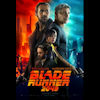
|
Blade Runner 2049 - Movie Review
After thirty-five years, is this sequel too-little-too-late, or is Blade Runner 2049 destined to become an important cultural milestone that lives up to its predecessor? [10/12/2017]
|

|
Movie Review: Godzilla (2014)
After the long build-up here at emagill.com, it's safe to say my expectations for Godzilla's latest entry were high, and yet they were still exceeded. [6/3/2014]
|
|
|
|
|